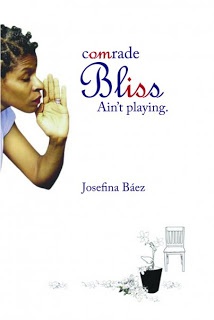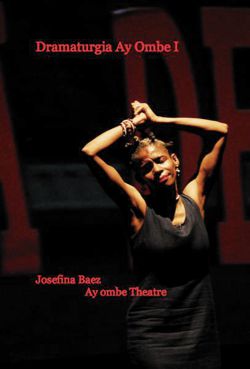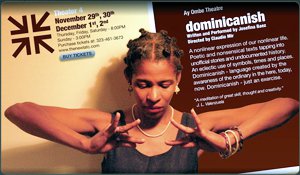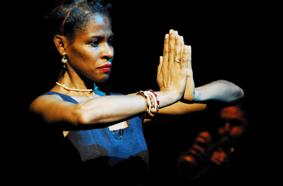
The Intricacies of Bliss in Diaspora: Dominican Diasporic Subjectivities in Josefina Báez’s Comrade Bliss Ain’t Playing
Danny Méndez, Michigan State University
 There are inquiries to which the number of responses is infinite, while the categorical circumstances in which each one is expressed is finite. I am going to pose a few of them in this essay: how is positive affect a necessary foundation for a diasporic body? Is it possible to construct (or even recognize) a Dominican identity in the diaspora that can elicit simultaneously bliss and gloom? How does this same bliss tie to possibility, to change, mobility and creative control of the “I” that structures an identity? My questions evoke different samples and different practices – in other words, they evoke subjectivity. While there are objective limits on the space in which the answers to these questions are worked out, there is an interior depth in which they assume meaning that is constructed intensively, rather than extensionally. In this case, our assumptions about the objective scope of the diaspora may lead us down a path of misfired interpellations that expose the ambiguity of the “national affects” governing Dominican national identities. That, in other words, makes it difficult to define the intersection between emotional representation and cultural patterns, in as much as this definitional work is done through “identity.” This is, I believe, one of the central themes at the center of Josefina Báez’s performance text, Comrade, Bliss Ain’t Playing (2008), which, from the beginning, frames identity as an interrogation more than a definition:
There are inquiries to which the number of responses is infinite, while the categorical circumstances in which each one is expressed is finite. I am going to pose a few of them in this essay: how is positive affect a necessary foundation for a diasporic body? Is it possible to construct (or even recognize) a Dominican identity in the diaspora that can elicit simultaneously bliss and gloom? How does this same bliss tie to possibility, to change, mobility and creative control of the “I” that structures an identity? My questions evoke different samples and different practices – in other words, they evoke subjectivity. While there are objective limits on the space in which the answers to these questions are worked out, there is an interior depth in which they assume meaning that is constructed intensively, rather than extensionally. In this case, our assumptions about the objective scope of the diaspora may lead us down a path of misfired interpellations that expose the ambiguity of the “national affects” governing Dominican national identities. That, in other words, makes it difficult to define the intersection between emotional representation and cultural patterns, in as much as this definitional work is done through “identity.” This is, I believe, one of the central themes at the center of Josefina Báez’s performance text, Comrade, Bliss Ain’t Playing (2008), which, from the beginning, frames identity as an interrogation more than a definition:
What does life verify anyway?
What does the dance of life move towards anyway?
A divine choreography for the sake of the moment?
Overly redundant.
I am telling you what you are seeing. (2-3)
As is evident in her directions in the two sentences that follow the question, the non-verbal, the deictic, the affective quality of identity will not be dissolved in the metaphoric possibilities of speech. It is also important to note that the directions do not, on the other hand, erase what has been said. Which makes the listener wonder about the status of the questions – are they simply built for sense, or are they also built for sound? My reflection on these questions reads them through the figure of the “melancholic migrant” in Sarah Ahmed’s recent book The Promise of Happiness (2010), a critique of the ideology of the pursuit of happiness. She constructs this figure out of the conservative attack on multiculturalism as a form of ‘ungluing’ society, and the liberal idea that the migrant wound in society must be ‘repaired’ by ‘building bridges’ to integrate the migrant. Ahmed, directed by the Lacanian insight that identification is not a neutral cognitive act, but involves the “transformation that takes place in the subject” – that is, it is an affective and dynamic act that unsettles the equal sign at the center of identity, posits the migrant’s sensitivity to identity shifts against the consumerist promise that identity is painlessly purchased.
Setting the stage in the next stop of the always evolving and, seemingly, treacherous performance of Dominican identities displacing one another, Báez presents a narrative voice that carries the marks of a development that is independent of, and in contrast to, her previous performance text, Dominicanish (2000). Among the many differences between Dominicanish and Comrade, Bliss Ain’t Playing the first and most obvious is that the language of the latter is standard English. This decision may signal that historic moment in the collective migrant consciousness where hybridity, the mixed language and gestures, are no longer so easily processed or recognized within the binaries (linguistic, cultural, political) that they parody and play. In this sense, Baez’s decision to begin Bliss with the following words from her mother, María Pérez Báez, are crucial as we carefully navigate into new territories of explorations of the self:
God, I do not know where any member of my family is.
But you do. That comforts me.
Maria Perez vda. Báez
(my mother) (1)
As Edyta Oczkowics has noted, these words serve to eliminate the opposition of English as the ‘colonial language’ and Spanish as ‘mother tongue’ by making the mother’s tongue literally English (2). In fact, I believe it provides an unsettling point departure for an audience that knows Baez's work or persona. It seems to announce a cutting of the links between the Dominican Republic and its diasporic communities, and a resignation to that divorce as a fait accompli. We are no longer in the territory of the unheimlich, the uncanniness that traversed Dominicanish, with its pleasure in Spanish or Spanglish expressions, and its flaunting of its liminality. Here we seem to be immersed in another moment entirely, one in which the energy has gone out of resisting the colonial English presence inside the English tongue. Comrade, Bliss Aint’s Playing does not stage the characteristic issues that ensue from simultaneously living an identity in Spanish in the Dominican Republic and in Spanglish in New York City. Gone is the prospect that Spanglish contains poetic powers that transcend its status as a transitional dialect. As I am contrasting these pieces, it may seem, in fact, that the bliss in Bliss is entirely ironized and melancholic, a mask worn over a deeper mourning. But this is to accept that the post-hybridity in Comrade, Bliss Ain’t Playing entirely cuts us off from the utopian prospects of the postnational and the self-deconstructing identities that refuse the old trick of swearing allegiance to some eternal essence of a culture. I believe a better way of reading this piece is to take the loss of knowing “where any member of my family is” as conjoined with the trust that the author of the piece does know where they are–and thus has in a sense inherited the knowledge. With Comrade, Bliss Ain’t Playing the diaspora comes full circle, as the sentiments that propelled it forward, as an idea initially, are revisited, calling into question the ideal sentiment at its center: bliss. Defined as a general feeling of euphoria and extreme or perfect happiness, the bliss in Báez’s text is not quite indicative of an ideal happiness, a negation of melancholia, inasmuch as we are constantly invited to consider it within the diasporic context of dispersion. Hence the titular phrasing of “comrade, bliss ain’t playing,” which can be read from two directions: that bliss and play (as in the play of the signifier) are two different things; or that bliss has come to stay – is serious, instead of “playing.”
energy has gone out of resisting the colonial English presence inside the English tongue. Comrade, Bliss Aint’s Playing does not stage the characteristic issues that ensue from simultaneously living an identity in Spanish in the Dominican Republic and in Spanglish in New York City. Gone is the prospect that Spanglish contains poetic powers that transcend its status as a transitional dialect. As I am contrasting these pieces, it may seem, in fact, that the bliss in Bliss is entirely ironized and melancholic, a mask worn over a deeper mourning. But this is to accept that the post-hybridity in Comrade, Bliss Ain’t Playing entirely cuts us off from the utopian prospects of the postnational and the self-deconstructing identities that refuse the old trick of swearing allegiance to some eternal essence of a culture. I believe a better way of reading this piece is to take the loss of knowing “where any member of my family is” as conjoined with the trust that the author of the piece does know where they are–and thus has in a sense inherited the knowledge. With Comrade, Bliss Ain’t Playing the diaspora comes full circle, as the sentiments that propelled it forward, as an idea initially, are revisited, calling into question the ideal sentiment at its center: bliss. Defined as a general feeling of euphoria and extreme or perfect happiness, the bliss in Báez’s text is not quite indicative of an ideal happiness, a negation of melancholia, inasmuch as we are constantly invited to consider it within the diasporic context of dispersion. Hence the titular phrasing of “comrade, bliss ain’t playing,” which can be read from two directions: that bliss and play (as in the play of the signifier) are two different things; or that bliss has come to stay – is serious, instead of “playing.”
Báez’s mother’s two lines at the beginning of the text have a strong symbolic weight, in as much Báez’s mother’s admission of the reality of the diaspora and migration as an ongoing process that connects the past, the future and the present, and her legacy to her daughter of knowing where the members of the family are, makes “the bliss turn” problematic. The motherland that has been abandoned, and that in turn abandons the metaphor of itself as an extended family, makes us wonder how the daughter who has inherited knowledge of the extended diasporic family could keep that knowledge (conditioned on dispersion and loss) and still be blissful. Although my coinage of the “bliss turn” paraphrases Ahmed’s coinage of the concept of the “the happiness turn” in cultural studies which has considered, and more so within migration studies, “a return to classical questions of what is happiness, and what makes for a good life or a life good” (Ahmed 2008: 2), it does differ in some crucial ways. If as Ahmed has argued the turn to happiness has implicated a narrative of happiness as being in turmoil since in the end it is nothing but a narrative of disappointment, the “bliss turn” as we have in Báez’s text is a narrative of reassertion and unessentialized identities that are nebulous and constantly unfixed. The persona Báez develops in the piece is characterized by feeling constantly in motion. That motion exists on the plane of geography, social identity, and affect. Her persona is recognized by her mother as being a sort of archive of materials. These materials, which concern the identity and place of members of the diaspora, include her identity and place. This, of course, puts her outside the logic of types, as she is both an archive and an item in an archive: she exists as a constant to and fro, a mutable player, both the commentator on her life and the subject of it. As the narrative voice indicates right from the start:
In this precise moment, I cannot assure you much. Dream and life,
alike, are disputing their truthfulness.
So called dream. So called life.
Dreams I want them as dreams
And life… as such.
….
Before, my dreams predicted the future, recalled the past and
echoed the present
…
And in between dream and reality:
Fingerprints. (1)
Fingerprints, of course, are not only the anchors of identity in the vast archive of the security sector in the United States, but they are, quasi mythically, the unique signature pressed by our body on the material of the world. In this essay I want to take up these elements: the dreamlike quality of Dominican identities–the material press of the body on the world – and the intervention of bliss as proposed in Comrade, Bliss Ain’t Playing. My hypothesis is that through an active and direct engagement with the condition of a bliss grown serious, Báez is coding themes present in the current dialogue in migration studies over multiculturalism, hybridity and utopic and dystopic views of immigration.
 In an earlier analysis I made of Dominicanish, I argued that through the mutability of Báez’s heroine we are presented with the multiple cultural and social realities that traverse current global communities and form lines of flight and intricate fissures beneath the surface of the official vision of cultures (Méndez 2012:154). On my present reading of Comrade, Bliss Ain’t Playing, I would contend that Báez has not finished with the fusing and fissioning of multiple worlds, a part of Báez’s project but the diasporic body – the site of the emotions — takes an even greater valance within the “the drama of contingency” in which diaspora is darkly shadowed in dispersion, the moment when mobility becomes loss. Ahmed notes how the corporal vernacular of gestures and attitudes, and the internal feeling of the body image, unfolds for the migrant in split ways in their new host societies, carrying with them carrying with them a desire for bliss as a lifestyle: the famous promise of a better life that is stereotypically described as the American dream– as though a country as economically rational and ‘awake’ as the United States is driven forward, ultimately, by a moment of unconscious vision rather than calculative self interest. In the case of the heroine in Comrade, Bliss Ain’t Playing this better life starts by relishing the euphoria of being able to define herself. Again this brings to mind Ahmed’s assertion in “The Politics of Good Feeling” when she says that: “To describe happiness as intentional does not mean there is always any simple correspondence between objects and feelings…It is not just that we are happy about something, but some things become happy for us, if we imagine they will bring happiness to us” (4). Ahmed’s sense of the pathetic fallacy at the base of the post-modern cult of happiness has a relevance to the way in which, in Báez’s text, the diaspora, with the “ungluing” that is its condition, understands the ‘objects’ in which happiness is invested under the sign of the return that makes them uncanny. These objects do not have to have a simple correspondence with the feelings portrayed. The uncanny is a way of demystifying the happy object – and it is for this reason that Báez turns to bliss and not happiness as the affect correlate to liberation, which is how she negotiates the ‘ungluing’ of the diaspora and its stylistic power. It is from the diaspora point of view that bliss and happiness come apart, and follow different paths to different fates.
In an earlier analysis I made of Dominicanish, I argued that through the mutability of Báez’s heroine we are presented with the multiple cultural and social realities that traverse current global communities and form lines of flight and intricate fissures beneath the surface of the official vision of cultures (Méndez 2012:154). On my present reading of Comrade, Bliss Ain’t Playing, I would contend that Báez has not finished with the fusing and fissioning of multiple worlds, a part of Báez’s project but the diasporic body – the site of the emotions — takes an even greater valance within the “the drama of contingency” in which diaspora is darkly shadowed in dispersion, the moment when mobility becomes loss. Ahmed notes how the corporal vernacular of gestures and attitudes, and the internal feeling of the body image, unfolds for the migrant in split ways in their new host societies, carrying with them carrying with them a desire for bliss as a lifestyle: the famous promise of a better life that is stereotypically described as the American dream– as though a country as economically rational and ‘awake’ as the United States is driven forward, ultimately, by a moment of unconscious vision rather than calculative self interest. In the case of the heroine in Comrade, Bliss Ain’t Playing this better life starts by relishing the euphoria of being able to define herself. Again this brings to mind Ahmed’s assertion in “The Politics of Good Feeling” when she says that: “To describe happiness as intentional does not mean there is always any simple correspondence between objects and feelings…It is not just that we are happy about something, but some things become happy for us, if we imagine they will bring happiness to us” (4). Ahmed’s sense of the pathetic fallacy at the base of the post-modern cult of happiness has a relevance to the way in which, in Báez’s text, the diaspora, with the “ungluing” that is its condition, understands the ‘objects’ in which happiness is invested under the sign of the return that makes them uncanny. These objects do not have to have a simple correspondence with the feelings portrayed. The uncanny is a way of demystifying the happy object – and it is for this reason that Báez turns to bliss and not happiness as the affect correlate to liberation, which is how she negotiates the ‘ungluing’ of the diaspora and its stylistic power. It is from the diaspora point of view that bliss and happiness come apart, and follow different paths to different fates.
However, given the hegemonic context of the pursuit of happiness ideology, we cannot simply take bliss as something separate and in-itself. Happiness is its socially recognized counterpart. As Ahmed points out, the exteriorization of happiness that lends it to metrics used in the circulation of commodities and to bending the idea to being those goods and services that make us “feel good.” Such a measure of happiness leads us down a binary whereby the opposite of happiness must be by definition that that makes us “feel bad” (Ahmed 2010: 6), or bad objects and services. And thus, to be asked whether one is happy or not the presumption is “…not just that people are being asked to evaluate their life situations but that they are being asked to evaluate their life situations through categories that are value laden” (Ahmed 2010: 5). The positioning of Báez’s heroine living her life and performing her multiple conditions as a immigrant woman in the United States without ascribing to any potential external discourses that would reduce her to any one finite category is in direct correlation with Báez’s decision to privilege bliss over happiness in this context. If bliss is a permanently accessible state, for Báez’s heroine, it comes from understanding that emotions can’t be administered:
I am telling you what you are seeing.
Illustrating.
Verbatim.
Thought to word to deed.
Now that I have lived my death,
Let’s get on with life. (My emphasis, 3).
The opposites in play here are variations on the poles of bliss and melancholia, life and death, forgetting and memorialization that have organized the text from the beginning. The “telling” is at odds with the illustrating/showing and the verbatim is everything but an exactitude of who she is as a character in this new host society. The process that is privileged in this game of continued identity constructions lies in the clearly stated cycle of “thought to word to deed” which both emphasizes an identity (“thought to word”) but destabilizes when it becomes enacted (“deed”). If we are to consider happiness as a feeling measured under value laden qualifiers then bliss, not innocently chosen by Báez, operates under different registers.
an identity (“thought to word”) but destabilizes when it becomes enacted (“deed”). If we are to consider happiness as a feeling measured under value laden qualifiers then bliss, not innocently chosen by Báez, operates under different registers.
Peter H. Van Ness’s definition of bliss on his article, “Endangered Bliss: Reflections on Joy and Religion,” is particularly illuminating for our own reading and more so when he indicate that: “By bliss I mean experiences of supreme well-being-vital health, great achievement, intense belonging, the joy of being extraordinarily alive. There are plausible reasons to believe that such experiences have become estranged from at least public expressions of religious life” (My emphasis, 215). Although Van Ness’s approach to the topic of bliss is understandably associated to religion and nostalgia his considerations are in interesting counterpoint to the processes of adaptation and belonging we have come analyze in diasporic communities, and the way, as Ahmed points out, that the melancholic migrant has come to figure them in the backlash against multiculturalism. In this sense, the melancholy of the migrant resides in her refusal to give up the possibility of bliss. Van Ness extends his insight when he carefully scrutinizes two passages from two different religious traditions, one from Euripides, The Bacchae (the Chorus in particular) and the other one from the bible to indicate how “bliss” and “blessed” have been utilized almost interchangeably but with very different interpretations of both passages, as he elaborates:
the recipients of blessings in the two passages seem remarkably different. In the Lukan passage the blessed are identified by what they lack and endure; their intentional acts are promised for a future day when they will “laugh” and “leap for joy.” Very differently, the Bacchantes are identified by what they know, wear, and carry. Their joy is manifest in worship and dance in the moment of their blessing. (217)
 In Van Ness’s assessment the recipients of bliss in these two passages endure a classic crisis in which identity (with its potential for bliss) lies in either the soul or the body, respectively. Extrapolating this idea of the identity of bodies to a diasporic setting it resonates to some degree with Ahmed’s signaling of feelings: “It matters how feelings are distributed. It matters who promises our conversion. Some bodies become sore points, points of trouble, where communication stops. Other bodies become bearers of the promise of happiness” (12). I have dealt with the cardinal points of hybridity and affectivity in my book, Narrative of Migration and Displacement in Dominican Literature (2012), and since I feel that I have best expressed my approach there, I hope the reader will excuse me for quoting myself at some length. The considerations made by Ahmed, and to some extent those made by Van Ness, alludes to the effect of hybridity on what Paul Gilroy, has phrased as “those structures of feeling that might be termed the inner dialectics of diaspora identification.”(1) Although this context for the “Structures of feeling” in Gilroy’s work is the African diaspora in a transatlantic context and its cultural impact in the Caribbean and eventually England, I borrow his emphasis on the emotional aspect which, enduring changes over time and place, became an affective pattern within the “Black British” identity. Similarly, it has endured in the
In Van Ness’s assessment the recipients of bliss in these two passages endure a classic crisis in which identity (with its potential for bliss) lies in either the soul or the body, respectively. Extrapolating this idea of the identity of bodies to a diasporic setting it resonates to some degree with Ahmed’s signaling of feelings: “It matters how feelings are distributed. It matters who promises our conversion. Some bodies become sore points, points of trouble, where communication stops. Other bodies become bearers of the promise of happiness” (12). I have dealt with the cardinal points of hybridity and affectivity in my book, Narrative of Migration and Displacement in Dominican Literature (2012), and since I feel that I have best expressed my approach there, I hope the reader will excuse me for quoting myself at some length. The considerations made by Ahmed, and to some extent those made by Van Ness, alludes to the effect of hybridity on what Paul Gilroy, has phrased as “those structures of feeling that might be termed the inner dialectics of diaspora identification.”(1) Although this context for the “Structures of feeling” in Gilroy’s work is the African diaspora in a transatlantic context and its cultural impact in the Caribbean and eventually England, I borrow his emphasis on the emotional aspect which, enduring changes over time and place, became an affective pattern within the “Black British” identity. Similarly, it has endured in the Dominican identity I am theorizing. This conception of “structures of feeling” also returns us to the work of Raymond Williams, obviously an inspiration for the affective turn, here. Williams ties it to literature, and suggests that our perception of these affective structures within literature have a heuristic value in as much as we imagine a space where the performance of identities and subjectivities endure and change within the stress and flux of history. Perceiving literature as an enterprise that must be read with an awareness of the “present” of the reader rather than as a enclosed and completed work, Williams proclaims that: “In spite of substantial and at some level decisive continuities in grammar and vocabulary, no generation speaks quite the same language as its predecessors…What really changes is something quite general, over a wide range, and the description that often fits the change best is the literary ‘style.’”(2) I would like to emphasize the idea of generational differences when recounting lived experiences of a specific moment and the necessity of formulating new expressions to describe them, as Williams argues: “Such changes can be defined as changes in structures of feeling. The term is difficult, but ‘feeling’ is chosen to emphasize a distinction from more formal concepts as ‘world-view’ or ‘ideology’...It is that we are concerned with meanings and values as they are actively lived and felt…”(3) Here Gilroy’s phrasing of an “inner dialectics of a Diaspora identification” evidently borrows Williams’ use of “structures of feelings” as the locus in which the non-homogeneities of diasporic identification are registered (Méndez 2012: 4-5).
Dominican identity I am theorizing. This conception of “structures of feeling” also returns us to the work of Raymond Williams, obviously an inspiration for the affective turn, here. Williams ties it to literature, and suggests that our perception of these affective structures within literature have a heuristic value in as much as we imagine a space where the performance of identities and subjectivities endure and change within the stress and flux of history. Perceiving literature as an enterprise that must be read with an awareness of the “present” of the reader rather than as a enclosed and completed work, Williams proclaims that: “In spite of substantial and at some level decisive continuities in grammar and vocabulary, no generation speaks quite the same language as its predecessors…What really changes is something quite general, over a wide range, and the description that often fits the change best is the literary ‘style.’”(2) I would like to emphasize the idea of generational differences when recounting lived experiences of a specific moment and the necessity of formulating new expressions to describe them, as Williams argues: “Such changes can be defined as changes in structures of feeling. The term is difficult, but ‘feeling’ is chosen to emphasize a distinction from more formal concepts as ‘world-view’ or ‘ideology’...It is that we are concerned with meanings and values as they are actively lived and felt…”(3) Here Gilroy’s phrasing of an “inner dialectics of a Diaspora identification” evidently borrows Williams’ use of “structures of feelings” as the locus in which the non-homogeneities of diasporic identification are registered (Méndez 2012: 4-5).
The structures of feeling that inform Báez’s works do not determine where the feelings go–how they turn up–in those works. What they do, however, is enact and provide a vehicle for a “…practical consciousness of a present kind, in a living and interrelating continuity…”(4) in the face of the discontinuity that is her heritage. In other words, her affective universe edged with the possibility that diaspora means total dissolution–with, as its extreme, the terrible diaspora imposed on African peoples during the three centuries of the slave trade. Hence the indication made by Báez’s character in Comrade, Bliss Ain’t Playing:
Now that I have lived my death,
Let’s get on with life. (3).
With this never to be healed rupture at her back, Báez’s access to blessedness must be, at the same time, an encounter with death: death must be lived in order to move on to the promise of blessedness encoded in bliss.
 As a Dominican born woman residing in New York City, Josefina Báez’s body of work reflects her ever-evolving views of nationality, gender, race and ethnicity. Her work as a poet, performer, and actress accordingly reflects a social reality that goes beyond discourses of Dominicanness or “lo dominicano.” Her texts, Dominicanish (2000), Comrade Bliss Ain’t Playing (2008),(5) and Levente no.yolayorkdominicanyork (2011) each employ a unique assemblage of verse, prose, and movement, theatricalizing the experience of dominicanidad under the aspect of demystifying identities and setting them free. As Camilla Stevens indicates, this is a program that “… reject[s] territorial and essentialist nationalisms in favor of transnational subjectivities”(6) In this sense, Baez’s work is recognizably affiliated with the aesthetic worked out by a number of Dominican performers and playwrights since the 1990s to generate a theater of experiences that understood the polyvalence of Dominican identities from the vantage point of the diaspora.(7)
As a Dominican born woman residing in New York City, Josefina Báez’s body of work reflects her ever-evolving views of nationality, gender, race and ethnicity. Her work as a poet, performer, and actress accordingly reflects a social reality that goes beyond discourses of Dominicanness or “lo dominicano.” Her texts, Dominicanish (2000), Comrade Bliss Ain’t Playing (2008),(5) and Levente no.yolayorkdominicanyork (2011) each employ a unique assemblage of verse, prose, and movement, theatricalizing the experience of dominicanidad under the aspect of demystifying identities and setting them free. As Camilla Stevens indicates, this is a program that “… reject[s] territorial and essentialist nationalisms in favor of transnational subjectivities”(6) In this sense, Baez’s work is recognizably affiliated with the aesthetic worked out by a number of Dominican performers and playwrights since the 1990s to generate a theater of experiences that understood the polyvalence of Dominican identities from the vantage point of the diaspora.(7)
As is the case for those works that are governed by the rules of improvisation that make every performance a variation, in Comrade, Bliss Ain’t Playing the cultural condition of being Dominican is a practice or ejercicio that reacts differently depending on the peculiarities of the stage and its audience. Diffused between multiple locations, past, present and future experiences are narrated as if happening at once; as such, they are reflective, I propose, of the emotional condition of Báez’s narrator in Comrade, Bliss Ain’t Playing.
Báez’s narrator in Comrade, Bliss Ain’t Playing.
As I have also mentioned before, this emotional condition echoes Sophie Maríñez’s understanding of Báez’s Dominicanish text when she notes that:
Se podría incluso decir que su valor no reside en tratar de describir la experiencia migratoria sino en que va más lejos de la representación social, más allá de la supuesta realidad, y se concentra en evocar la relación con el mundo a través de una escritura diferida, presentando la realidad del inmigrante a través de referentes movedizos y múltiples.(8)
[You could even say that its value lies not in it trying to describe the experience of immigration, instead, it goes beyond social representation, beyond the supposed reality, and focuses on evoking the relationship with the world through a deferred writing that presents the reality of immigrants through shifting and multiple references].
Nelson Goodman, the philosopher, once distinguished between scripts and scores by the fact that the former is a complete work, whereas the latter is “a set of performances compliant with it.”(9) Goodman’s distinction is based on the modern notion of the autonomy of the work that extracts it from its opening to Williams’ structures of feelings. In a strong sense, Báez’s innovation, which is perhaps conditioned by her self-conscious position within the diaspora, is to traverse the dualism between script and score and open the work to the structures of feeling that erode or erase the work’s monumentality. The Comrade, Bliss Ain’t Playing text thus is made out of the images and symbols that populate Josefina’s social and cultural experience in La Romana and New York City, while converting them into a nonlinear and somewhat chaotic narrative structure that is directed to, and changed by, the presence of the spectator. Performance, here, is exercised outside the monumental space of the imagined nation, or the mythologized communities. If the threat of multiculturalism is that it ‘unglues’ people from their context, Comrade, Bliss Ain’t Playing flaunts that ungluing.
Notes
1. Paul Gilroy, The Black Atlantic: Modernity and Double Consciousness (New York: Verso, 1993), 23.
2. Raymond Williams, Marxism and Literature (Oxford: Oxford University Press, 1977), 131.
3. Williams, Marxism and Literature, 132.
4. Williams, Marxism and Literature, 132.
5. For an engaging analysis of the themes of Dominican diasporic subjectivities with an emphasis on race and gender on Báez’s most recent performance/text, Comrade, Bliss Ain’t Playing see, Edyta Oczkowicz, “Playing with Diaspora in Josefina Baez’s Comrade Bliss Ain’t Playing,” this paper was presented at the Association of Caribbean Women Writers Conference at the University of Louisiana in April 2010.
6. Camilla Stevens, “The Politics of Abjection in P.A.R.G.O: Los Pecados Permitidos by Waddys Jáquez,” Symposium 61:4(2008), 256.
7. Stevens, “The Politics of Abjection…” 256.
8. Sophie Maríñez, “Poética de la relación en Dominicanish de Josefina Báez” La Torre 10:35(2005): 153.
9. Cited in Tim Ingolds, Lines: A Brief History (New York: Routledge, 2007), 121.
Cited Works
Ahmed, Sara. The Promise of Happiness. Durham: Duke University Press, 2010.
-------.“The Politics of Good Feeling.” Australian Critical Race and Whiteness Studies Association E-Journal 4:1 (2008): 1-18.
Báez, Josefina. Levente no. yolayorkdominicanyork. New York: Ay Ombe Theatre, 2011.
-------. Comrade, Bliss Ain’t Playing. New York: Ay Ombre Theatre, 2008.
-------. Dominicanish. New York: I Ombe, 2000.
Gilroy, Paul. The Black Atlantic: Modernity and Double Consciousness. New York: Verso, 1993.
Ingold, Tim. Lines: A Brief History. New York: Routledge, 2007.
Maríñez, Sophie. “Poética de la relación en Dominicanish de Josefina Báez.” La Torre 10:35 (2005): 149-160.
Méndez, Danny. Narratives of Migration and Displacement in Dominican Literature. New York: Routledge, 2012.
Oczkowicz, Edyta. “Playing with Diaspora in Josefina Baez’s Comrade Bliss Ain’t Playing,” Paper presented at the Association of Caribbean Women Writers Conference at the University of Louisiana in April 2010.
Stevens, Camilla. “The Politics of Abjection in P.A.R.G.O: Los Pecados Permitidos by Waddys Jáquez,” Symposium 61:4 (2008): 255-265.
Van Ness, Peter H. “Endangered Bliss: Reflections on Joy and Religion.” Journal of Religion and Health 35:3 (Fall 1996): 215-224.
Williams, Raymond. Marxism and Literature. Oxford: Oxford University Press, 1977.

